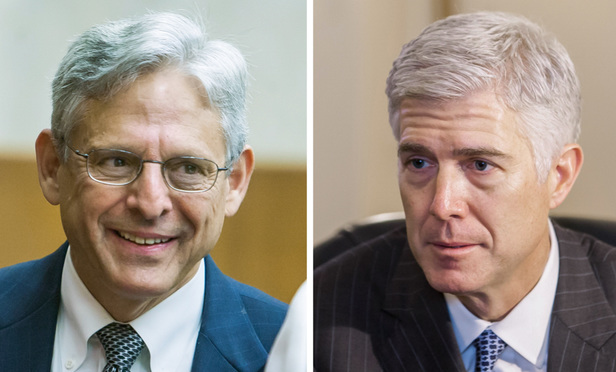 Merrick Garland and Neil Gorsuch
Merrick Garland and Neil Gorsuch
On Jan. 3, after a record-setting 293 days lying essentially untouched, Judge Merrick Garland’s nomination to the U.S. Supreme Court came to an unceremonious end.
With the close of the 114th Congress’s term, it expired — a casualty of U.S. Senate Majority Leader Mitchell McConnell’s bold tactic of insisting from the start that a Supreme Court nomination made by a president with less than a year left in office was not deserving of the Senate’s time or respect.
It was a sad day for Garland and President Barack Obama. For the future of the federal judicial appointment process, it may well prove to be even sadder. With the Senate Judiciary Committee’s hearings on Supreme Court nominee Judge Neil Gorsuch set to begin on March 20, we won’t have to wait long to find out.
I deeply believe that Garland would have been an outstanding justice and that he — and the American people — fully deserved to have his qualifications to sit on the high court be the subject of committee hearings and an up-or-down Senate vote.
I also deeply believe that McConnell’s leadership in derailing Garland’s nomination was nothing less than an abuse of his constitutional authority.
Even in the rough-and-tumble world of Washington politics, it crossed a line to refuse a Supreme Court nominee the basic courtesy and rudimentary due process of hearings and a Senate vote. But the problems with McConnell’s behavior go beyond that.
His intransigence obviously was rooted in his, and many of his Senate Republican colleagues’, strong disapproval of the impact that confirming Garland was apt to have on future Supreme Court decisions.
Garland’s written opinions and voting patterns in two decades as a federal appellate judge hardly suggested he was a sure bet to vote on the high court in ways that consistently would displease McConnell, but there is no denying that he appeared likely to vote most often with the high court’s “liberal” wing.
‘A RUINOUS PRECEDENT’
Was it wrong for McConnell to consider Garland’s likely votes on the high court? Not at all. Considering a nominee’s likely votes is entirely in keeping with a senator’s responsibility to decide whether the appointment would be in nation’s best interests.
But McConnell did not simply consider Garland’s likely votes. He refused to consider anything else. For him, Garland’s promise of excellence in terms of personal integrity, professional experience and judicial temperament was simply beside the point.
McConnell set a powerful, and ruinous, precedent for an appointment process in which nothing counts except the nominee’s likely votes.
For the sake of the Supreme Court and the federal courts in general, however, I very much hope that those senators who share my outrage at McConnell’s behavior do not attempt to repay him in kind. Two wrongs definitely won’t make a right.
For the past decade if not longer, the federal judicial appointment process has become hopelessly politicized. McConnell’s shelving of the Garland nomination simply took the politicization of that process to its logical, and terribly unfortunate, conclusion.
A BETTER APPROACH
Those senators most upset by the fate of the Garland nomination can take a major step toward liberating the process from the political paralysis that ails it by giving Gorsuch the full and fair consideration that Garland should have received. It is time to repudiate, not reaffirm, the precedent McConnell set.
Whether full and fair consideration means a vote for confirmation, however, very much remains to be seen.
In terms of his educational and professional achievements, breadth and depth of knowledge, and flair for writing, Gorsuch surely offers considerable promise to be a distinguished appointment to the Supreme Court.
However, at this juncture, there is still a great deal to be learned about how he measures up in terms of various other factors that should figure at least as prominently in any senator’s thinking about, and vote on, confirmation.
The confirmation hearings will be informative, and with them, the intense media scrutiny that accompanies any Supreme Court nomination will shift into high gear. It will become much more apparent in the coming days, for example, whether Gorsuch indeed has the high level of integrity, objectivity and open-mindedness that every senator, regardless of his or her political leanings, should demand in a Supreme Court nominee before voting for confirmation.
In addition, as the process unfolds, the Garland supporters in the Senate will acquire a far better sense of whether they should count Gorsuch’s likely voting patterns on the Supreme Court as a substantial strike against him. While Garland’s supporters can’t realistically expect this president to nominate liberal Democrats, they can reasonably insist on a nominee more mainstream in thinking than U.S. Supreme Justices Clarence Thomas or Samuel Alito.
Yes, there should be a Justice Merrick Garland on today’s Supreme Court. But his supporters in the Senate can best honor him now by setting an example of full and fair consideration that will help restore the federal judicial appointment process to what our nation needs it to be.
Gary J. Simson is senior vice provost for scholarship and Macon chair in Law at Mercer University and professor emeritus of law at Cornell University. His constitutional law scholarship includes various articles on the Supreme Court appointment process.




